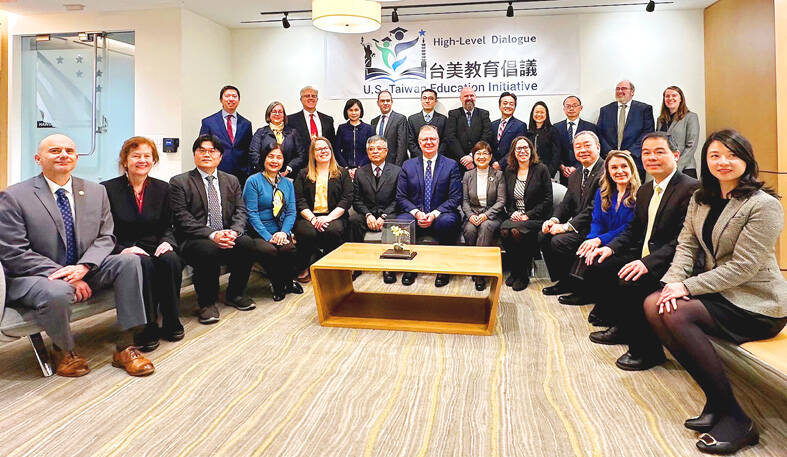Taiwan and the US on Monday reaffirmed their commitment to deepening cooperation in English and Mandarin-language education, with a view to expanding their collaboration to include the sciences.
Deputy Minister of Education Liu Mon-chi (劉孟奇) led a delegation of ministry officials to the fourth high-level dialogue under the Taiwan-US Education Initiative in Washington, the Ministry of Education said in a news release yesterday.
The ministry presented the outcome of bilateral cooperation in Mandarin and bilingual education; exchanges between elementary, junior-high schools and universities; and cultivation of semiconductor talent, it said.

Photo courtesy of the Ministry of Education
Significant progress in promoting Mandarin education has been made since the last dialogue in February last year, Liu said.
A record 3,080 US students are to come to Taiwan to study Mandarin this year, while the ministry selected 147 Mandarin-language teachers and teaching assistants to teach in the US, he said.
Taiwan provided subsidies to 20 universities in Taiwan and 56 universities in the US to promote quality Mandarin education under the Huayu Best (台灣優華語計畫) program, he said, adding that four Taiwan Centers for Mandarin Learning were established last year.
The University Academic Alliance in Taiwan, consisting of 12 universities in Taiwan, has signed memorandums of understanding with three US university systems for cooperation in the fields of semiconductors, engineering sciences and Mandarin-language education, he said.
Thanking the US government for continuing to support bilingual education in Taiwan by sending professional English teachers, the ministry said it hoped that the two nations could extend the cooperation to cover STEM — science, technology, engineering and mathematics — education in elementary and junior-high schools.
Also present at the meeting were National Security Council Deputy Secretary-General Hsu Szu-chien (徐斯儉), who joined online, Overseas Community Affairs Council Minister Hsu Chia-ching (徐佳青) and Representative to the US Alexander Yui (俞大?).
On the US side, attendees included US Assistant Secretary of State for East Asian and Pacific Affairs Daniel Kritenbrink, US Deputy Assistant Secretary of State for East Asian and Pacific Affairs Camille Dawson, American Institute in Taiwan (AIT) Chairwoman Laura Rosenberger and AIT Managing Director for the Washington office Ingrid Larson.
After the meeting, the delegation visited the University of Maryland, a partner in the Huayu Best Program, to discuss with university president Darryll Pines plans to provide Mandarin courses focusing on professional fields to US students coming to Taiwan for internships, the ministry said.
The US-Taiwan Education Initiative was launched in 2020 and was expanded last year to allow more young Americans to learn Mandarin in Taiwan, and more Taiwanese Mandarin instructors to teach in the US, the Ministry of Foreign Affairs said yesterday.
Working with the Foundation for Scholarly Exchange (Fulbright Taiwan), the government is promoting the use of English as the medium of instruction for English-language classes in universities and recruiting more English teaching assistants to meet its Bilingual 2030 policy, it said.

INVESTIGATION: The case is the latest instance of a DPP figure being implicated in an espionage network accused of allegedly leaking information to Chinese intelligence Democratic Progressive Party (DPP) member Ho Jen-chieh (何仁傑) was detained and held incommunicado yesterday on suspicion of spying for China during his tenure as assistant to then-minister of foreign affairs Joseph Wu (吳釗燮). The Taipei District Prosecutors’ Office said Ho was implicated during its investigation into alleged spying activities by former Presidential Office consultant Wu Shang-yu (吳尚雨). Prosecutors said there is reason to believe Ho breached the National Security Act (國家安全法) by leaking classified Ministry of Foreign Affairs information to Chinese intelligence. Following interrogation, prosecutors petitioned the Taipei District Court to detain Ho, citing concerns over potential collusion or tampering of evidence. The

‘FORM OF PROTEST’: The German Institute Taipei said it was ‘shocked’ to see Nazi symbolism used in connection with political aims as it condemned the incident Sung Chien-liang (宋建樑), who led efforts to recall Democratic Progressive Party (DPP) Legislator Lee Kun-cheng (李坤城), was released on bail of NT$80,000 yesterday amid an outcry over a Nazi armband he wore to questioning the night before. Sung arrived at the New Taipei City District Prosecutors’ Office for questioning in a recall petition forgery case on Tuesday night wearing a red armband bearing a swastika, carrying a copy of Adolf Hitler’s Mein Kampf and giving a Nazi salute. Sung left the building at 1:15am without the armband and apparently covering the book with a coat. This is a serious international scandal and Chinese

Seventy percent of middle and elementary schools now conduct English classes entirely in English, the Ministry of Education said, as it encourages schools nationwide to adopt this practice Minister of Education (MOE) Cheng Ying-yao (鄭英耀) is scheduled to present a report on the government’s bilingual education policy to the Legislative Yuan’s Education and Culture Committee today. The report would outline strategies aimed at expanding access to education, reducing regional disparities and improving talent cultivation. Implementation of bilingual education policies has varied across local governments, occasionally drawing public criticism. For example, some schools have required teachers of non-English subjects to pass English proficiency

TRADE: The premier pledged safeguards on ‘Made in Taiwan’ labeling, anti-dumping measures and stricter export controls to strengthen its position in trade talks Products labeled “made in Taiwan” must be genuinely made in Taiwan, Premier Cho Jung-tai (卓榮泰) said yesterday, vowing to enforce strict safeguards against “origin laundering” and initiate anti-dumping investigations to prevent China dumping its products in Taiwan. Cho made the remarks in a discussion session with representatives from industries in Kaohsiung. In response to the US government’s recent announcement of “reciprocal” tariffs on its trading partners, President William Lai (賴清德) and Cho last week began a series of consultations with industry leaders nationwide to gather feedback and address concerns. Taiwanese and US officials held a videoconference on Friday evening to discuss the